- Home
- David Gemmell
Drenai Saga 01 - Legend Page 2
Drenai Saga 01 - Legend Read online
Page 2
“Yes.”
“No, I didn’t. I stood for two minutes, shaking. And you got cut.”
“But you still came in, Rek. Don’t you see? It didn’t matter about the cut—you still rescued me.”
“It matters to me. Is there a candle in my room?”
Behind him was the fortress, grim and gray, outlined in flame and smoke. The sounds of battle filled his ears, and he ran, heart pounding, his breathing ragged. He glanced behind him. The fortress was close, closer than it had been. Ahead were the green hills sheltering the Sentran Plain. They shimmered and retreated before him, taunting him with their tranquility. He ran faster. A shadow fell across him. The gates of the fortress opened. He strained against the force pulling him back. He cried and begged. But the gates closed, and he was back at the center of the battle, a bloody sword in his shaking hand.
He awoke, eyes wide, nostrils flared, the beginning of a scream swelling his lungs. A soft hand stroked his face, and gentle words soothed him. His eyes focused. Dawn was nearing, the pink light of a virgin day piercing the ice on the inside of the bedroom window. He rolled over.
“You were troubled in the night,” Besa told him, her hand stroking his brow. He smiled, pulled the goosedown quilt over his shoulder, and drew her to him under the covers.
“I’m not troubled now,” said Rek. “How could I be?” The warmth of her body aroused him, and his fingers caressed her back.
“Not today,” she said, kissing him lightly on the forehead and pulling away. She threw back the quilt, shivered, and ran across the room, gathering her clothes. “It’s cold,” she said. “Colder than yesterday.”
“It’s warm in here,” he offered, raising himself to watch her dress. She blew him a kiss.
“You’re fine to romp with, Rek. But I’ll have no children by you. Now, get out of that bed. We’ve a party of travelers coming in this morning, and the room is let.”
“You’re a beautiful woman, Besa. If I had any sense, I’d marry you.”
“Then it’s a good job you have none, for I’d turn you down and your ego would never stand it. I’m looking for someone more solid.” Her smile took the sting from her words. Almost.
The door opened, and Horeb bustled in bearing a copper tray containing bread, cheese, and a tankard.
“How’s the head?” he asked, placing the tray on the wooden table by the bed.
“Fine,” said Rek. “Is that orange juice?”
“It is, and it’ll cost you dear. Nessa waylaid the Vagrian trader as he left the ship. She waited an hour and risked frostbite just to get oranges for you. I don’t think you’re worth it.”
“True.” Rek smiled. “Sad but true.”
“Are you really heading south today?” asked Besa as Rek sipped his fruit juice. He nodded. “You’re a fool. I thought you’d had enough of Reinard.”
“I’ll avoid him. Are my clothes cleaned?”
“Dori spent hours on them,” said Besa. “And for what? So that you can get them filthy in Graven Forest.”
“That’s not the point. One should always look one’s best when leaving a city.” He glanced at the tray. “I can’t face the cheese.”
“Doesn’t matter,” said Horeb. “It’s still on the bill!”
“In that case I’ll force myself to eat it. Any other travelers today?”
“There’s a spice caravan heading for Lentria that will go through Graven. Twenty men, well armed. They’re taking the circular route south and west. There’s a woman traveling alone, but she’s already left,” said Horeb. “Lastly there’s a group of pilgrims. But they don’t leave until tomorrow.”
“A woman?”
“Not quite,” said Besa. “But almost.”
“Now, girl,” said Horeb, smiling broadly, “it’s not like you to be catty. A tall girl with a fine horse. And she’s armed.”
“I could have traveled with her,” said Rek. “It might have made the journey more pleasant.”
“And she could have protected you from Reinard,” said Besa. “She looked the part. Now come on, Regnak, get dressed. I’ve not the time to sit here and watch you breakfast like a lord. You’ve caused enough chaos in this house.”
“I can’t get up while you’re here,” protested Rek. “It wouldn’t be decent.”
“You idiot,” she said, gathering up the tray. “Get him up, Father, else he’ll lie there all day.”
“She’s right, Rek,” said Horeb as the door closed behind her. “It’s time for you to move, and knowing how long it takes you to prepare your public appearance, I think I’ll leave you to get on with it.”
“One must look one’s best—”
“When leaving a city. I know. That’s what you always say, Rek. I’ll see you downstairs.”
Once he was alone, Rek’s manner changed, the laughter lines about his eyes easing into marks of tension, sorrow almost. The Drenai were finished as a world power. Ulric and the Nadir tribes had already begun their march upon Drenan, and they would ride into the cities of the plains on rivers of blood. Should every Drenai warrior kill thirty tribesmen, still there would be hundreds of thousands left.
The world was changing, and Rek was running out of places to hide.
He thought of Horeb and his daughters. For six hundred years the Drenai race had stamped civilization on a world ill suited to it. They had conquered savagely, taught wisely, and in the main ruled well. But they had arrived at their sunset, and a new empire was waiting, ready to rise from the blood and ashes of the old. He thought again of Horeb and laughed. Whatever happens, there is one old man who will survive, he thought. Even the Nadir need good inns. And the daughters? How would they fare when the hordes burst the city gates? Bloody images flooded his mind.
“Damn!” he shouted, rolling from the bed to push open the ice-sealed window.
The winter wind struck his bed-warmed body, snatching his mind back to the reality of today and the long ride south. He crossed to the bench on which his clothes had been laid out and swiftly dressed. The white woolen undershirt and the blue hose were gifts from gentle Dori, the tunic with gold embroidered collar a legacy of better days in Vagria, the reversed sheepskin jerkin and gold ties a present from Horeb, and the thigh-length doeskin boots a surprise gift from a weary traveler at an outland inn. And he must have been surprised, thought Rek, remembering the thrill of fear and excitement as he had crept into the man’s room to steal them only a month earlier. By the wardrobe stood a full-length bronze mirror, where Rek took a long look at his reflection. He saw a tall man with shoulder-length brown hair and a well-trimmed mustache, cutting a fine figure in his stolen boots. He looped his baldric over his head and placed his longsword in the black and silver sheath.
“What a hero,” he told his reflection, a cynical smile on his lips. “What a gem of a hero.” He drew the sword and parried and thrust at the air, one eye on his reflection. The wrist was still supple, the grasp sure. Whatever else you are not, he told himself, you are a swordsman. From the sill by the window he took the silver circlet talisman—his good-luck charm since he had stolen it from a brothel in Lentria—and placed it over his forehead, sweeping his dark hair back over his ears.
“You may not actually be magnificent,” he told his reflection, “but by all the gods in Missael you look it!”
The eyes smiled back at him. “Don’t you mock me, Regnak Wanderer,” he said. Throwing his cloak over his arm, he strolled downstairs to the long room, casting an eye over the early crowd. Horeb hailed him from the bar.
“Now, that’s more like it, Rek my lad,” he said, leaning back in mock admiration. “You could have stepped straight from one of Sieben’s poems. Drink?”
“No. I think I will leave it a while yet—like ten years. Last night’s brew is still fermenting in my gullet. Have you packed me some of your vile food for the journey?”
“Maggoty biscuits, mildewed cheese, and a two-year-old back of bacon that will come when you call it,” answered Horeb. “And a flask of t
he worst—”
Conversation ceased as the seer entered the inn, his faded blue habit flapping against bony legs, his quarterstaff tapping on the wooden boards. Rek swallowed his disgust at the man’s appearance and avoided glancing at the ruined sockets where once the man’s eyes had been.
The old man pushed out a hand on which the third finger was missing. “Silver for your future,” he said, his voice like a dry wind whispering through winter branches.
“Why do they do it?” whispered Horeb.
“Their eyes, you mean?” countered Rek.
“Yes. How can a man put out his own eyes?”
“Damned if I know. They say it aids their visions.”
“Sounds about as sensible as cutting off your staff in order to aid your sex life.”
“It takes all sorts, Horeb, old friend.”
Drawn by the sound of their voices, the old man hobbled nearer, hand outstretched. “Silver for your future,” he intoned. Rek turned away.
“Go on, Rek,” urged Horeb. “See if the journey bodes well. Where’s the harm?”
“You pay. I will listen,” said Rek.
Horeb thrust a hand deep into the pocket of his leather apron and dropped a small silver coin into the old man’s palm. “For my friend here,” he said. “I know my future.”
The old man squatted on the wooden floor and reached into a tattered pouch, producing a fistful of sand, which he sprinkled about him. Then he produced six knucklebones bearing crafted runes.
“They’re human bones, aren’t they?” whispered Horeb.
“So they say,” answered Rek. The old man began to chant in the Elder tongue, his quavering voice echoing in the silence. He threw the bones to the sandy floor, then ran his hands over the runes.
“I have the truth,” he said at last.
“Never mind the truth, old man. Give me a tale full of golden lies and glorious maidens.”
“I have the truth,” said the seer, as if he had not heard.
“The hell with it!” said Rek. “Tell me the truth, old man.”
“Do you desire to hear it, man?”
“Never mind the damned ritual, just speak and begone!”
“Steady, Rek, steady! It’s his way,” said Horeb.
“Maybe. But he’s going a long way toward spoiling my day. They never give good news, anyway. The old bastard’s probably going to tell me I shall catch the plague.”
“He wishes the truth,” said Horeb, following the ritual, “and will use it wisely and well.”
“Indeed he does not and will not,” said the seer. “But destiny must be heard. You do not wish to hear words of your death, Regnak the Wanderer, son of Argas, and so I will withhold them. You are a man of uncertain character and only a sporadic courage. You are a thief and a dreamer, and your destiny will both haunt and hunt you. You will run to avoid it, yet your steps will carry you toward it. But then, this you know, Longshanks, for you dreamed it yester-eve.”
“Is that it, old man? That meaningless garbage? Is that fair trading for a silver coin?”
“The earl and the legend will be together at the wall. And men shall dream, and men shall die, but shall the fortress fall?”
The old man turned and was gone.
“What was your dream last night, Rek?” asked Horeb.
“You surely don’t believe that idiocy, Horeb?”
“What was your dream?” the innkeeper persisted.
“I didn’t dream at all. I slept like a log. Except for that bloody candle. You left it on all night, and it stank. You must be more careful. It could have started a fire. Every time I stop here, I warn you about those candles. You never listen.”
2
Rek watched in silence as the groom saddled the chestnut gelding. He did not like the horse; it had a mean eye, and its ears lay flat against its skull. The groom, a young slim boy, was crooning gently to it as his shaking fingers tightened the girth.
“Why couldn’t you get a gray?” asked Rek. Horeb laughed.
“Because it would have taken you one step too many toward farce. Understatement is the thing, Rek. You already look like a peacock, and as it is, every Lentrian sailor will be chasing you. No, a chestnut’s the thing.” More seriously he added, “And in Graven you may wish to be inconspicuous. A tall white horse is not easily missed.”
“I don’t think it likes me. See the way it looks at me?”
“Its sire was one of the fastest horses in Drenan; its dam was a war-horse in Woundweaver’s lancers. You couldn’t get a better pedigree.”
“What is it called?” asked Rek, still unconvinced.
“Lancer,” answered Horeb.
“That has a nice ring to it. Lancer … Well, maybe … just maybe.”
“Daffodil’s ready, sir,” said the groom, backing away from the chestnut. The horse swung its head, snapping at the retreating boy, who stumbled and fell on the cobbles.
“Daffodil?” said Rek. “You bought me a horse called Daffodil?”
“What’s in a name, Rek?” answered Horeb innocently. “Call it what you like; you must admit it’s a fine beast.”
“If I didn’t have a fine sense for the ridiculous, I would have it muzzled. Where are the girls?”
“Too busy to be waving good-bye to layabouts who rarely pay their bills. Now, be off with you.”
Rek advanced gingerly toward the gelding, speaking softly. It turned a baleful eye on him but allowed him to swing into the high-backed saddle. He gathered the reins, adjusted his blue cloak to just the right angle over the horse’s back, and swung the beast toward the gate.
“Rek, I almost forgot,” called Horeb, pushing back toward the house. “Wait a moment!” The burly innkeeper disappeared from sight, emerging seconds later carrying a short bow of horn and yew and a quiver of black-shafted arrows. “Here. A customer left this behind in part payment some months ago. It looks like a sturdy weapon.”
“Wonderful,” said Rek. “I used to be a fine bowman.”
“Yes,” said Horeb. “Just remember when you use it that the sharp end is pointed away from you. Now begone—and take care.”
“Thanks, Horeb. You, too. And remember what I said about candles.”
“I will. On your way, boy. Be lucky now.”
Rek rode from the south gate as the watchmen trimmed the lantern wicks. The dawn shadows were shrinking on the streets of Drenan, and young children played beneath the portcullis. He had chosen the southern route for the most obvious of reasons. The Nadir were marching from the north, and the fastest way from a battle was a straight line in the opposite direction.
Flicking his heels, he urged the gelding forward toward the south. To his left the rising sun was breasting the blue peaks of the eastern mountains. The sky was blue, birds sang, and the sounds of an awakening city came from behind him. But the sun was rising, Rek knew, on the Nadir. For the Drenai it was dusk on the last day.
Topping a rise, he gazed down on Graven Forest, white and virginal under the winter snow. And yet it was a place of evil legends that normally he would have avoided. The fact that instead he chose to enter showed he knew two things: First, the legends were built around the activities of a living man; second, he knew that man.
Reinard.
He and his band of bloodthirsty cutthroats had their headquarters in Graven and were an open, festering sore in the body of trade. Caravans were sacked, pilgrims were murdered, women were raped. Yet an army could not seek them out, so vast was the forest.
Reinard. Sired by a prince of hell, born to a noblewoman of Ulalia. Or so he told it. Rek had heard that his mother was a Lentrian whore and his father a nameless sailor. He had never repeated this intelligence; he did not, as the phrase went, have the guts for it. Even if he had, he mused, he would not keep them long once he tried it. One of Reinard’s favorite pastimes with prisoners was to roast sections of them over hot coals and serve the meat to those poor unfortunates taken prisoner with them. If he met Reinard, the best thing would be to flatter th
e hell out of him. And if that did not work, to give him the latest news, send him in the direction of the nearest caravan, and ride swiftly from his domain.
Rek had made sure he knew the details of all the caravans passing through Graven and their probable routes. Silks, jewels, spices, slaves, cattle. In truth he had no wish to part with this information. Nothing would please him better than to ride through Graven quietly, knowing the caravaners’ fate was in the lap of the gods.
The chestnut’s hooves made little sound on the snow, and Rek kept the pace to a gentle walk in case hidden roots should cause the horse to stumble. The cold began to work its way through his warm clothing, and his feet were soon feeling frozen within the doeskin boots. He reached into his pack and pulled out a pair of sheepskin mittens.
The horse plodded on. At noon Rek stopped for a brief, cold meal, hobbling the gelding by a frozen stream. With a thick Vagrian dagger he chipped away the ice, allowing the beast to drink, then gave him a handful of oats. He stroked the long neck, and the chestnut’s head came up sharply, teeth bared. Rek leapt backward, falling into a deep snowdrift. He lay there for a moment, then smiled.
“I knew you didn’t like me,” he said. The horse turned to look at him and snorted.
As he was about to mount, Rek glanced at the horse’s hindquarters. Deep switch scars showed by the tail.
Gently, his hand moved over them. “So,” he said, “someone took a whip to you, eh, Daffodil? Didn’t break your spirit, did they, boy?” He swung into the saddle. With luck, he reckoned, he should be free of the forest in five days.
Gnarled oaks with twisted roots cast ominous dusk shadows across the track, and night breezes set the branches to whispering as Rek walked the gelding deeper into the forest. The moon was rising above the trees, casting a ghostly light on the trail. Teeth chattering, he began to cast about for a good camping site, finding one an hour later in a small hollow by an ice-covered pool. He built a stall in some bushes to keep the worst of the wind from the horse, fed it, and then built a small fire by a fallen oak and a large boulder. Out of the wind, the heat reflected from the stone, Rek brewed tea to help down his dried beef; then he pulled his blanket over his shoulders, leaned against the oak, and watched the flames dance.

 Bloodstone
Bloodstone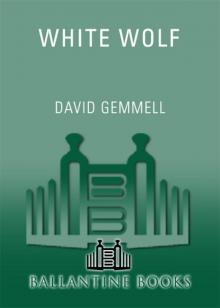 White Wolf
White Wolf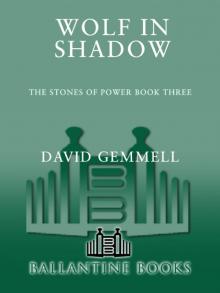 Wolf in Shadow
Wolf in Shadow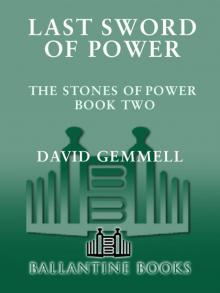 Last Sword of Power
Last Sword of Power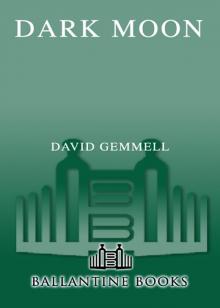 Dark Moon
Dark Moon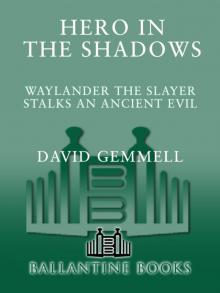 Hero in the Shadows
Hero in the Shadows Gemmell, David - Drenai 09 - Hero In The Shadows
Gemmell, David - Drenai 09 - Hero In The Shadows Waylander
Waylander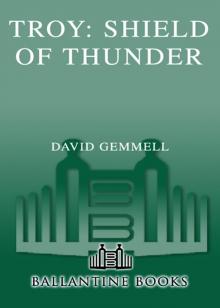 Shield of Thunder
Shield of Thunder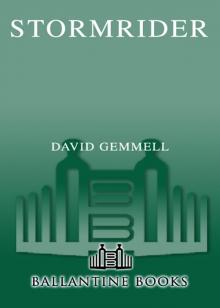 Stormrider Stormrider
Stormrider Stormrider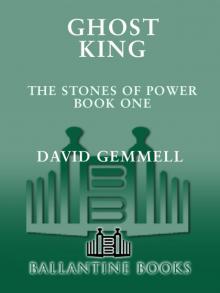 Ghost King
Ghost King Legend
Legend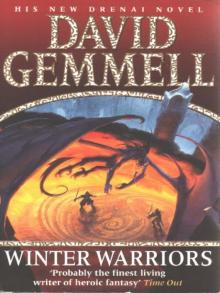 Winter Warriors
Winter Warriors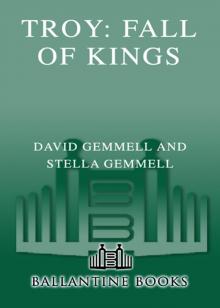 Fall of Kings
Fall of Kings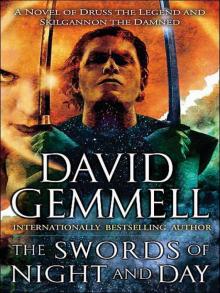 The Swords of Night and Day
The Swords of Night and Day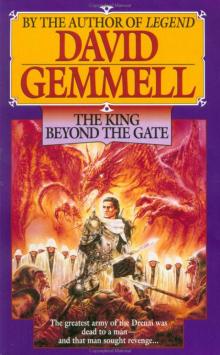 The King Beyond the Gate
The King Beyond the Gate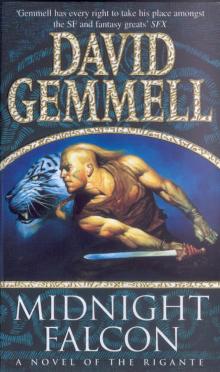 Midnight Falcon
Midnight Falcon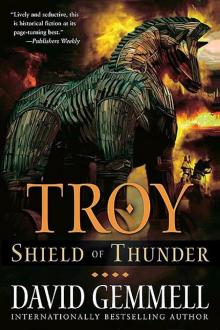 02 - Shield of Thunder
02 - Shield of Thunder In the Realm of the Wolf
In the Realm of the Wolf Ravenheart
Ravenheart The First Chronicles of Druss the Legend
The First Chronicles of Druss the Legend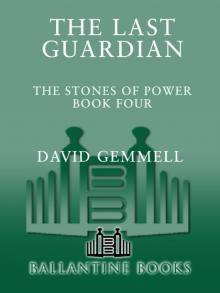 Last Guardian
Last Guardian Stormrider
Stormrider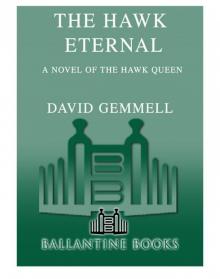 The Hawk Eternal
The Hawk Eternal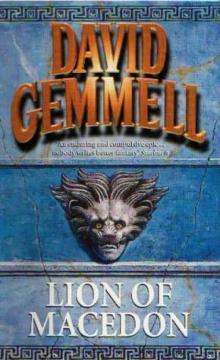 Lion of Macedon
Lion of Macedon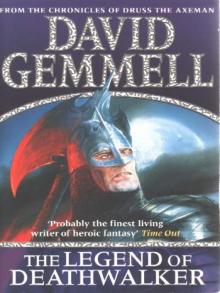 The Legend of Deathwalker
The Legend of Deathwalker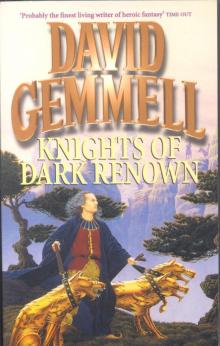 Knights of Dark Renown
Knights of Dark Renown Echoes of the Great Song
Echoes of the Great Song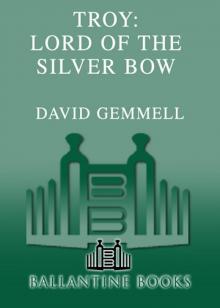 Lord of the Silver Bow
Lord of the Silver Bow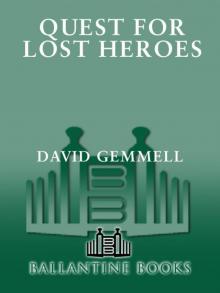 Quest for Lost Heroes
Quest for Lost Heroes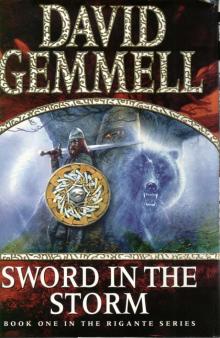 Sword in the Storm
Sword in the Storm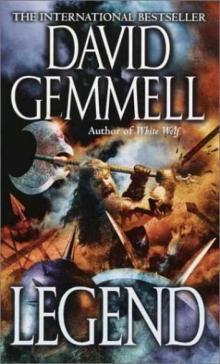 Drenai Saga 01 - Legend
Drenai Saga 01 - Legend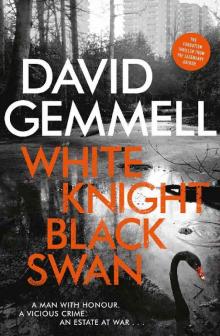 White Knight/Black Swan
White Knight/Black Swan![[Troy 02] - Shield of Thunder Read online](http://i1.bookreadfree.com/i/03/19/troy_02_-_shield_of_thunder_preview.jpg) [Troy 02] - Shield of Thunder
[Troy 02] - Shield of Thunder Lord of the Silver Bow t-1
Lord of the Silver Bow t-1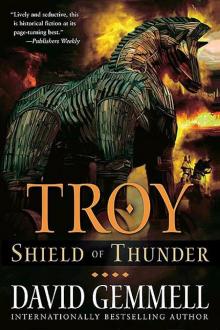 Shield of Thunder t-2
Shield of Thunder t-2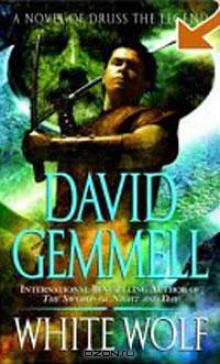 White Wolf: A Novel of Druss the Legend dt-10
White Wolf: A Novel of Druss the Legend dt-10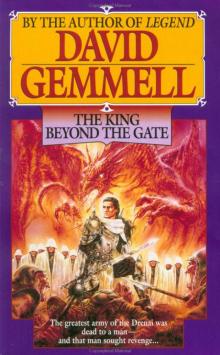 Drenai Saga 02 - The King Beyond the Gate
Drenai Saga 02 - The King Beyond the Gate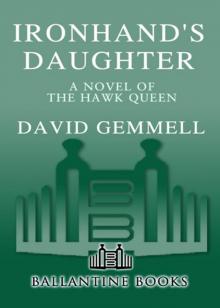 Ironhand's Daughter
Ironhand's Daughter Gemmell, David - Drenai 06 - The First Chronicles of Druss the Legend
Gemmell, David - Drenai 06 - The First Chronicles of Druss the Legend The Last Guardian
The Last Guardian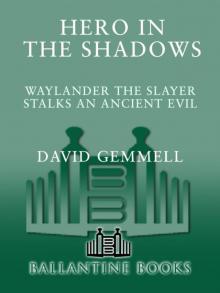 Hero in the Shadows: A Waylander the Slayer Novel
Hero in the Shadows: A Waylander the Slayer Novel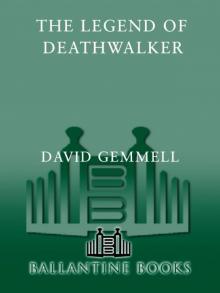 The Legend of the Deathwalker
The Legend of the Deathwalker